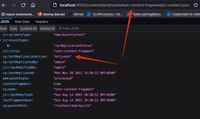This conversation has been locked due to inactivity. Please create a new post.



This conversation has been locked due to inactivity. Please create a new post.
Is there any AEM API which can give me the status of given content fragment when fetched by path whether it is published or not?
CURL https://BASEURI/.../_path
expected response: {"isPublished":true or false}
something like that
Solved! Go to Solution.
Views
Replies
Total Likes

Hi @spidey1405,
There are few options to get above information:

package com.mysite.core.servlets;
import com.day.cq.replication.ReplicationStatus;
import com.google.gson.JsonObject;
import org.apache.sling.api.SlingHttpServletRequest;
import org.apache.sling.api.SlingHttpServletResponse;
import org.apache.sling.api.resource.Resource;
import org.apache.sling.api.servlets.HttpConstants;
import org.apache.sling.api.servlets.SlingSafeMethodsServlet;
import org.osgi.service.component.annotations.Component;
import javax.servlet.Servlet;
import javax.servlet.ServletException;
import javax.servlet.http.HttpServletResponse;
import java.io.IOException;
@Component(service = Servlet.class, property = {
"sling.servlet.methods=" + HttpConstants.METHOD_GET,
"sling.servlet.resourceTypes=sling/servlet/default",
"sling.servlet.selectors=replicationStatus",
"sling.servlet.extensions=json" })
public class ReplicationStatusServlet extends SlingSafeMethodsServlet {
@Override
protected void doGet(SlingHttpServletRequest request, SlingHttpServletResponse response)
throws ServletException, IOException {
Resource resource = request.getResource();
ReplicationStatus replicationStatus = resource.adaptTo(ReplicationStatus.class);
JsonObject jsonObject = new JsonObject();
jsonObject.addProperty("isPublished", replicationStatus.isActivated());
response.setContentType("application/json");
response.getWriter().write(jsonObject.toString());
response.setStatus(HttpServletResponse.SC_OK);
}
}

Hi ,
Content fragment supported api
But there is no specific api for getting replication status.
Thanks
Views
Replies
Total Likes

Hi @spidey1405,
There are few options to get above information:

package com.mysite.core.servlets;
import com.day.cq.replication.ReplicationStatus;
import com.google.gson.JsonObject;
import org.apache.sling.api.SlingHttpServletRequest;
import org.apache.sling.api.SlingHttpServletResponse;
import org.apache.sling.api.resource.Resource;
import org.apache.sling.api.servlets.HttpConstants;
import org.apache.sling.api.servlets.SlingSafeMethodsServlet;
import org.osgi.service.component.annotations.Component;
import javax.servlet.Servlet;
import javax.servlet.ServletException;
import javax.servlet.http.HttpServletResponse;
import java.io.IOException;
@Component(service = Servlet.class, property = {
"sling.servlet.methods=" + HttpConstants.METHOD_GET,
"sling.servlet.resourceTypes=sling/servlet/default",
"sling.servlet.selectors=replicationStatus",
"sling.servlet.extensions=json" })
public class ReplicationStatusServlet extends SlingSafeMethodsServlet {
@Override
protected void doGet(SlingHttpServletRequest request, SlingHttpServletResponse response)
throws ServletException, IOException {
Resource resource = request.getResource();
ReplicationStatus replicationStatus = resource.adaptTo(ReplicationStatus.class);
JsonObject jsonObject = new JsonObject();
jsonObject.addProperty("isPublished", replicationStatus.isActivated());
response.setContentType("application/json");
response.getWriter().write(jsonObject.toString());
response.setStatus(HttpServletResponse.SC_OK);
}
}

Views
Likes
Replies
Views
Likes
Replies